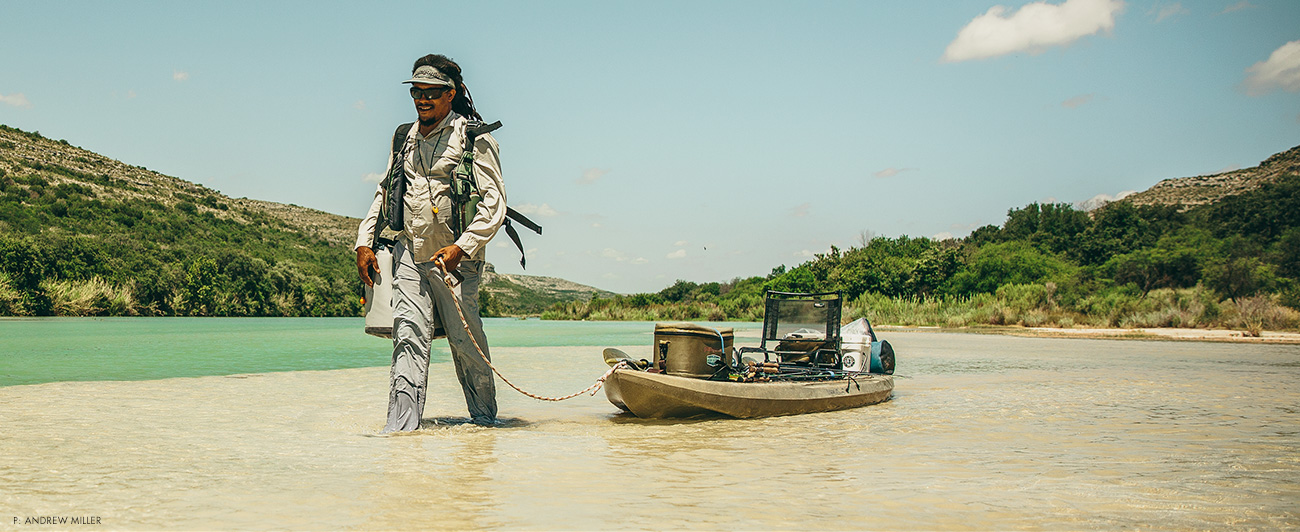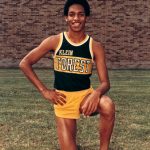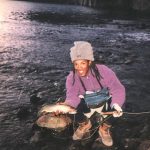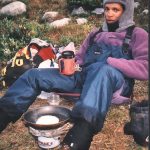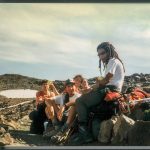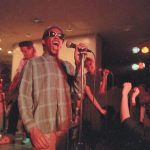Profile
Alvin Dedeaux
Steady Rolling: How Alvin Dedeaux Became Himself
We’re on the Colorado River, near Austin, TX, and Dedeaux is waxing poetic about the local metal scene. Ogershok, a metal guitarist turned local beer brewer, is just one of a few names that pop up during our conversation. In between casts, Dedeaux is trying his best to explain the difference between black metal and death metal. He’s doing better than most, but the distinction seems gray at best. He tells a story about another metal singer who was arrested for kidnapping and allegedly torturing a man just for challenging his “metal-ness.” Apparently, that’s a death metal thing to do. Now it’s making sense.
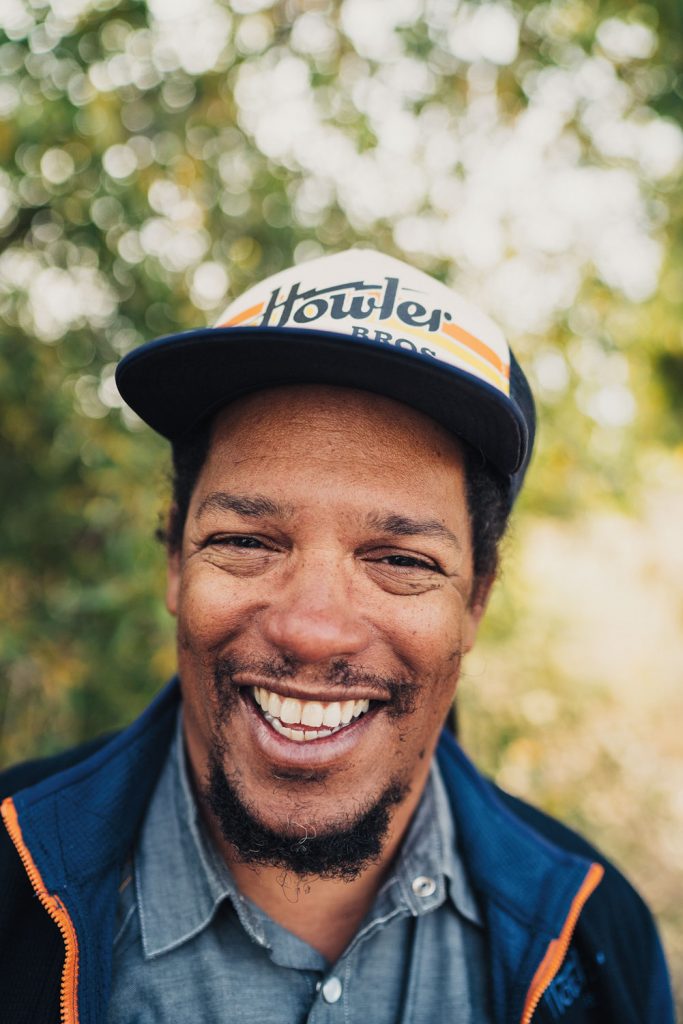
above Alvin Dedeaux—happy and chill as always—beams after a night spent on the South Fork of the Snake in Idaho with WorldCast Anglers. Photo: Nick Kelley
This is just one of the many topics we hit, but it seems to stick. It’s obvious that while his musician days are behind him, Dedeaux still likes to discuss music and all of its nuances while guiding. He retrieves his line slowly and gets a bump from something, immediately casting back to the same spot. No luck on the return cast.
It’s a cool morning on the Colorado, but for late November it couldn’t be better. It’s calm, quiet and we’ve only seen one cow muddying the river. We’ve run a few miles upstream in Alvin’s boat and are now hopping from spot to spot, hitting downed timber and deep pockets in search of Guadalupe bass.
Splitting Austin in half and flowing east out of its city limits all the way to the Gulf of Mexico, the Colorado is a famed river system, but one that’s also overlooked by many anglers who see it on a daily basis. Originating in the Llano Estacado, a massive mesa covering eastern New Mexico and West Texas, it meanders across the state, the surrounding flat plains and dramatic canyons eventually mellowing to rolling hills and pastureland. As Dedeaux navigates, the sandy banks of the river butt abruptly against eroded cliffs, with old farmhouses and dilapidated tractors peering precariously over the side. Rickety ladders, some 35 feet tall, rest against the cliffs to give landowners access to the river below.
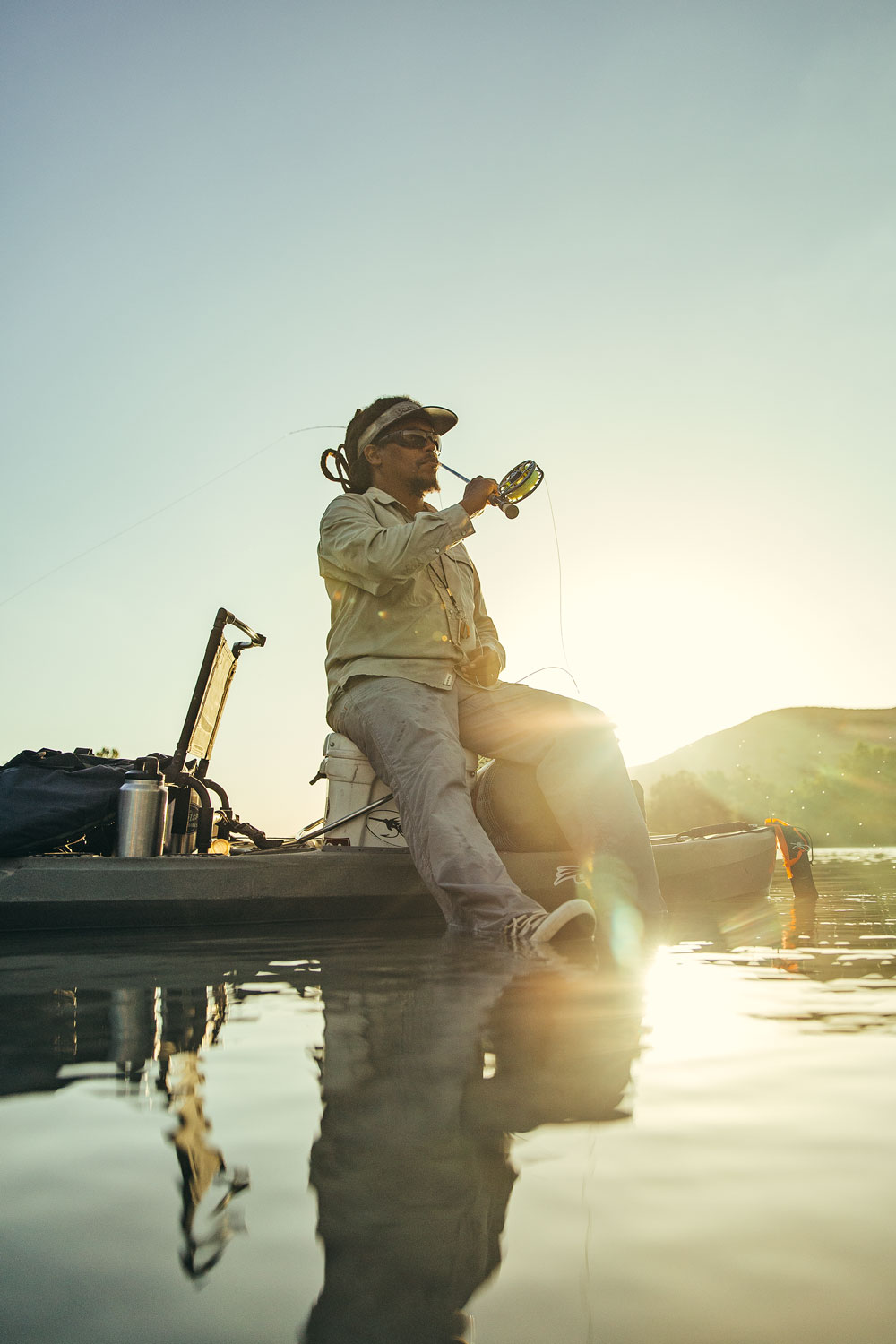
above Even after sweating out half your body weight and watching your skin turn to leather on Texas’ Devil’s River, there’s always somehow just enough energy at the end of the day for a few more hopeful casts. It sometimes seems like the times you’re half-assing it are the ones that bring the most memorable fish. Photo: Andrew Miller
We see one other boat on the water and a few canoes heading downstream. Herons peek their heads out of the brush on the banks before lumbering into the air and gliding in front of the boat as we head to the next spot.
Dedeaux has cut the back out of his hat so his dreadlocks can spill out. He’s wearing a worn pearl snap shirt and a pair of white rubber boots that his wife hates. He speaks with a thick Texas drawl, a voice that seems more fitting of a cattle rancher than a funk singer turned fishing guide. Despite years of playing deafening shows across the country, he wears a pair of noise-cancelling headphones that fellow guide and long-time friend JT Van Zandt gave him the Christmas before. He stops the boat alongside a deep run and lifts his rod for a cast.
“There we go,” he says as he hooks into a Guadalupe bass. The fish is small, even by “Guad” standards, but we’re happy to get him in the boat nonetheless. Dedeaux opens its mouth and shows me a patch on the fish’s tongue; it’s rough like sandpaper. “That’s probably the easiest way to tell if it’s a Guad. They’ve got that rough patch on their tongue—none of the other black bass have that.”
The fish is endemic to Texas’ Hill Country. It resembles a smallmouth bass in shape and behavior, with subtle differences in coloration. Guadalupe bass are prolific in the Colorado and its tributaries and Dedeaux’s long been attached to the fish and its natural environment. It’s something uniquely Texan, which can be hard to come by in fishing, and the flyfishing community at large has begun to notice. He mentions at several points that he’s beginning to see more anglers book trips specifically to tick the Guad off of their list.
Dedeaux’s reputation is beginning to grow as well. There’s something infectious about his personality: maybe it’s the moments of conversations between casts, thoughts on black metal and bass. Around his home waters of central Texas, Dedeaux is known for many things. He’s that flyfishing guide with the dreadlocks to some. To others, he’s the guy that was in that band. To me, sitting at the far end of the boat, he seems to be the sort of person whose depth is only hinted at, someone who’s lived more than they’re letting on.
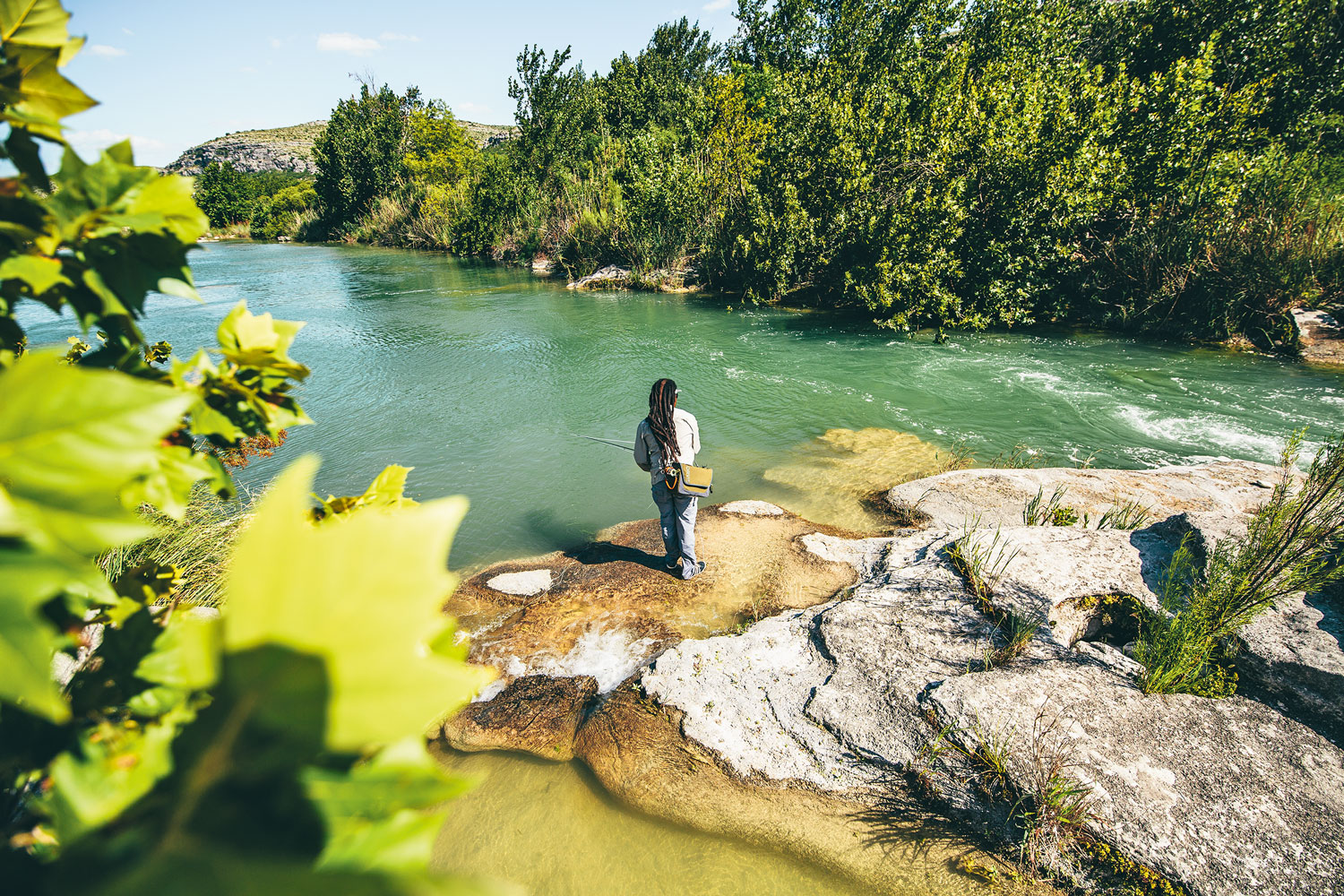
above These cartoon-like, desert oasis pools accentuate the Devil’s River in Texas. Stopping at each one can turn a three-day trip into a weeklong affair if you’re not careful, but that’s not necessarily a bad thing. Photo: Andrew Miller
Dedeaux was born in 1964 in Houston. His mother wanted all girls, and immediately fell short of her goal with Alvin as the first born, but she eventually got back on track—Dedeaux has five sisters.
“My dad was a smoking, drinking Catholic,” he recalls, then chuckles. “He joined the military so he didn’t have to become a priest because that was the only other way to get out of Mississippi.”
His mother was on the other end of the religious spectrum. The daughter of a Baptist preacher, she represented a more stable, by-the-book role. Their relationship worked regardless.
Everyone in his family fished, but they were bait fishers, more interested in filling the freezer than fishing for sport. When Dedeaux saw a fly rod in a magazine at age 12, he put it on his Christmas list that year—a bright yellow, 7-weight Eagle Claw with a Martin reel. Despite their differences in methodology, his family supported his new-found obsession. He recalls fishing trips to the coast, when his father and uncles would eventually let him practice his cast.
“I remember one trip we all went out and did pretty well, caught our limits,” Dedeaux says. “They let me take over the front of the boat with my fly rod. I don’t know what kind of fish they were—they reminded me of mackerel or something—but a school of them rolled through and I was catching fish on every cast. My dad, uncles and my cousins were totally amazed.”
Throughout his childhood, he’d spend days on the coast stalking redfish or on local rivers for anything that’d take a fly. In the 1970s, flyfishing was almost unheard of in Texas, much less for a kid from the inner city. “I remember as a teenager feeling weird, but I guess you’re supposed to feel weird as a teenager,” Dedeaux says. “I just started doing it. I was drawn to it. Flyfishing was just always there.” He moved to Austin in 1982 to attend the University of Texas but eventually dropped out because his heart just wasn’t in it. He called his parents and told them to stop sending money. Both of them were entrepreneurs in their own way—his dad owned a construction business—and he followed in their footsteps by making his way in the industry. He started working on foundations in the construction boom of the ’80s and then began hiring his own crews and operating independently. This was just before he joined his first band.
clockwise from top left (click to expand)
Dedeaux on the high school cross-country team, 1982. “I probably weighed 125 pounds or less in this pic,” he says. “I was running about 70 miles a week.” Photo: Courtesy Alvin Dedeaux
Dedeaux with a cutthroat from an inlet on Island Lake, in Wyoming’s Wind River Range, circa early ‘90s. Photo: Courtesy Alvin Dedeaux
A parking lot skate session before a Bad Mutha Goose show in Dallas in the late ‘80s. Photo: Courtesy Alvin Dedeaux
Drinking coffee and making pancakes at Island Lake, Wind River Range, WY. Photo: Courtesy Alvin Dedeaux
After fishing, we hit a small roadside barbeque joint on Highway 71, east of Austin. A smile creeps across Dedeaux’s face when the topic of his band days comes up. He joined Bad Mutha Goose and the Brothers Grimm in 1985 on a whim while running his construction business. A friend who was starting up a funk act said they needed a lead singer. He had no experience, but that didn’t stop him. Half joking, he describes himself as more of an entertainer than a musician.
“Our shows were pretty much chaos,” Dedeaux says. “If you turned the sound off, you’d definitely think it was a punk show. We’d have at least six band members, sometimes as many as 10 or 12. People would be dancing, but it was somewhere between dancing and a mosh pit. It was too loud for my mom, but my dad, he loved it. We played a couple of outdoor gigs in Houston, and my dad liked to come hang out backstage. He’d come out and introduce us, all dressed up in a suit. It was like church, except for the smoking and drinking.”
By most bands’ standards, BMGBG was very successful. They were well known in Texas and gained recognition on a national scale with airplay on college radio stations. They signed a development deal with three labels, including Atlantic and Warner, and toured heavily in Texas and around the country. “I remember we were on tour in the San Francisco Bay Area,” he says. “We heard one of our songs on the radio and then went into Tower Records and there was this big display with our CDs on it.”
Flyfishing never took a back seat. Dedeaux hauled his gear around on tour, leaving early the morning after a show in Dallas or Houston to head out to New Mexico or Colorado for a week until he’d meet the band at the next stop on the tour. To him, it just made sense. The contrast between those two worlds doesn’t even seem to register for him. Of course he’d bring his fly rod on tour.
“I didn’t see it as different. We used to play with Primus a lot in the Bay Area, and Les Claypool was a big fisherman. He didn’t flyfish, but we always talked about fishing. To me, it just made sense to do both,” Dedeaux says, then laughs. “But, I also didn’t think it was a big deal to be a punk-rock kid with a mohawk and also have a can of Copenhagen in my back pocket. Maybe it was just a Texas thing.”
The band’s success grew steadily for more than six years. But when Dedeaux’s bandmate and close friend Tim Kerr left BMGBG in 1992, he decided to do the same. Kerr is a local music legend in his own right, a founding member of Austin punk icons Big Boys, who had a major influence on artists like Chris Cornell of Soundgarden. As a true punk at heart, Kerr didn’t like the idea of record labels telling them what to do, and disagreements between band members eventually led to him leaving. After Dedeaux left, he joined a grunge band with a friend, but it never reached the same level of success as BMGBG.
CLOCKWISE FROM TOP LEFT (CLICK TO EXPAND)
“Though two of my buddies had already summited Washington state’s Mount Rainier during this season in the early 2000s, a storm blew in on our way to basecamp and we pretty much got blown off the mountain.” Photo: Courtesy Alvin Dedeaux
Style and skills: Dedeaux has both in spades and loves sharing his home water, Austin, TX’s Colorado River, with others.Photo: Adam Alexander
Clockwise from top left: Paul Johnson, Denia Ridley, Billy Pringle, Ryan Walker, Dedeaux and Tim Kerr of BMGBG. Photo: Ben Tecumseh DeSoto. Ben DeSoto Papers, Special Collections, University of Houston Libraries.
“The indie music scene prized those who had something to say and who said it well, and Bad Mutha Goose was one of those bands. I loved the wit of their songs. The lyrics to ‘Rev it Up’ have stuck with me over the years: ‘Yo listen, I learned my lesson / a car’s as evil as an AK47… Flying round corners / Knocking down poles / Driving through houses / and leaving big holes.’” Photo: Ben Tecumseh DeSoto. Ben DeSoto Papers, Special Collections, University of Houston Libraries.
Dedeaux says he doesn’t miss the band days. They had a fair amount of success, but the whole experience still seems like more of a lengthy anecdote to him, a fun story to tell. Still, there’s a connection between his passion for flyfishing and his touring days that seem to be closely tied together.
“I think the decision to be a guide, be my own boss, was influenced by the punk-rock scene,” Dedeaux says. “It was all about not having ‘the man’ tell you what to do, being in charge of your own destiny. Being a guide is definitely a nontraditional job. You’re definitely not working for ‘the man,’ so I think in a lot of ways being a flyfishing guide is pretty punk rock.”
It’s fairly easy to find videos of BMGBG on YouTube, and they’re good. In a clip from a SXSW show in 1990, Dedeaux hovers aggressively over the microphone to address the crowd.
“All of these bands are out here, trying to get signed and be famous, all of that shit. Let me tell you, the only thing that matters is you guys. None of this other shit counts, man,” he yells, motioning to the stage and then back to the crowd. “You motherfuckers are the ones who are making this shit happen. That’s all I’ve got to say.”
The band launches into a song. The bass is loud and Dedeaux thrashes around the stage like Henry Rollins. It’s a funk tune, but it may as well be a Black Flag show. He’s reckless and wild. He dances like a man possessed, the embodiment of full commitment. But for Dedeaux it was just a detour, a parallel path alongside his passion for flyfishing.
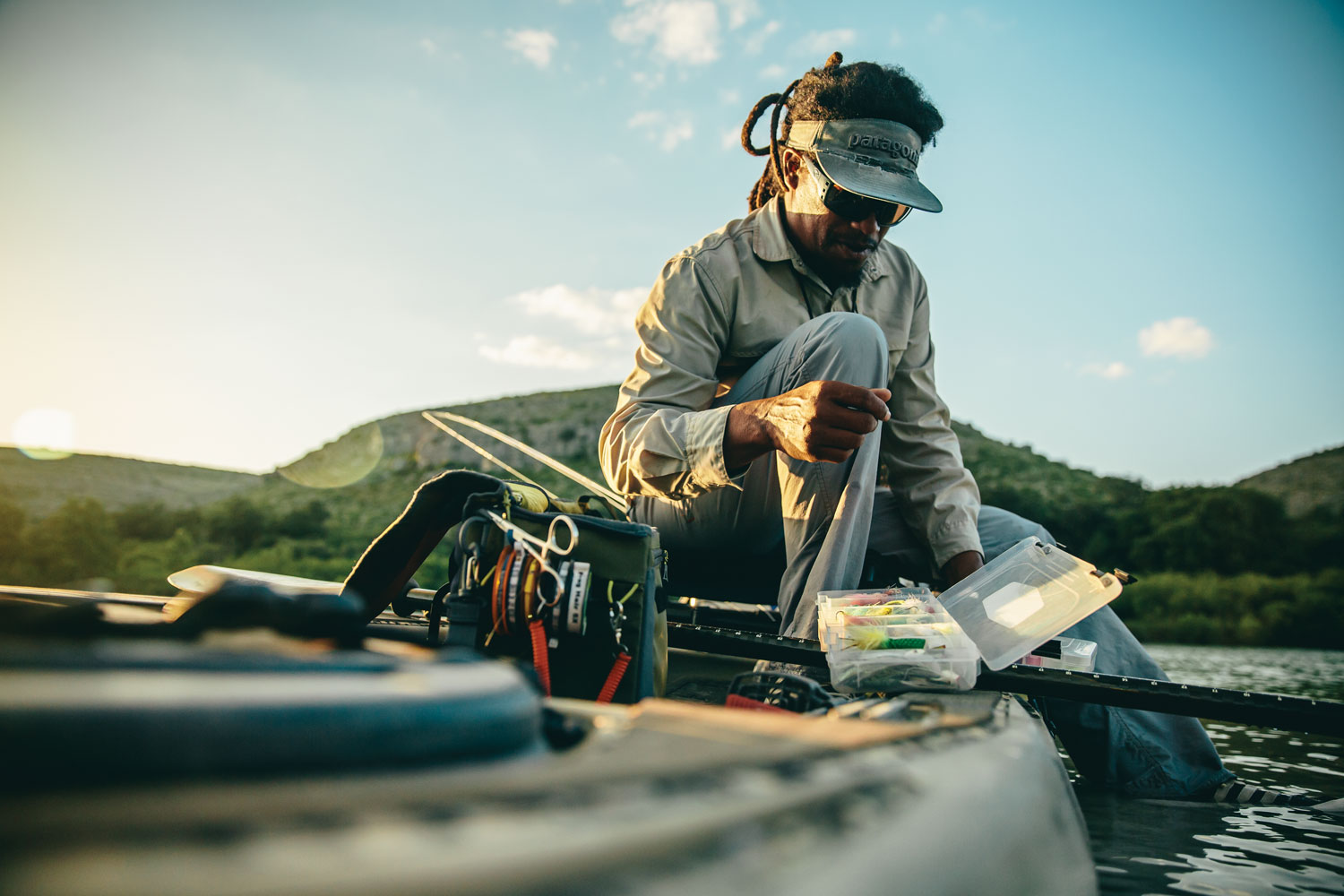
above Perhaps the most appealing part of fishing for bass is that they’ll eat almost anything, regardless of its resemblance to something in their food chain. Diehard bass guys like Alvin have a colorful cornucopia of home made offerings, some of which resemble a first grader’s art project in their simplicity. Photo: Andrew Miller
The day has warmed, and the buzz from the highway grows as trucks whine by and trail off into the afternoon air. The man sitting across the table resembles the lead singer of that band, filtered through the lens of a few decades. He still has that edge, but the river seems to have eroded a bit of it. The thrashing lead singer sits comfortably with an easy smile, sipping iced tea.
“I’ve definitely mellowed out since those days,” Dedeaux says. “It was just about being young and wanting to change the world. Seeing all of the injustice and feeling the need to point it out loud and clear to everyone. But things are the way they are. You can only change what you can change, and you have to live with the rest. I have a lot more inner calm than I did in those days. It’s kind of hard to be pissed out here.”
Before, during and after his band days, flyfishing was a constant. Dedeaux got a job at the Austin Angler, a local fly shop, in the early ’90s. It was there he began to meet fellow anglers in the community, people like JT Van Zandt, who would eventually become a renowned guide in his own respects. Dedeaux started guiding simply because customers started asking. He’d take them for trout trips on the Guadalupe River or for bass on the Colorado. But after the terrorist attacks on September 11, 2001, business slowed for many travel-dependent companies and the Austin Angler was not immune.
“I was out guiding for a couple days way out on the Llano River,” Dedeaux says. “I remember my client showed up for the trip, and they said, ‘We tried to go by the shop, but they said they were closed for inventory.’ I was like, Oh shit. We’re not doing inventory in July. Something’s going on. I get back to town, and my boss tells me we’re shutting it down.”
That moment was a turning point for Dedeaux. With the shop gone, he had no home base for his guide service. He had launched a website in 2001, and when the shop closed in 2004 he dove in full-time. He’d already amassed a solid client base, guiding both locally and in Chile, and the decision was an easy one. He stepped forward without hesitation. Austin Angler’s site was inactive, except for a message that said: “Thanks for the memories, Austin. If you want to go fishing, get in touch with Alvin.”
And people did. The guiding business steadily grew and Dedeaux started All Water Guides in 2011, which at any given time may have more than a dozen guides operating under its name. He takes clients out on several rivers in central Texas and has now expanded to redfish and speckled sea trout on the Texas coast. He spent 10 summers guiding in Colorado, and has fished for trout in Chile and Argentina, but Texas has always been home.
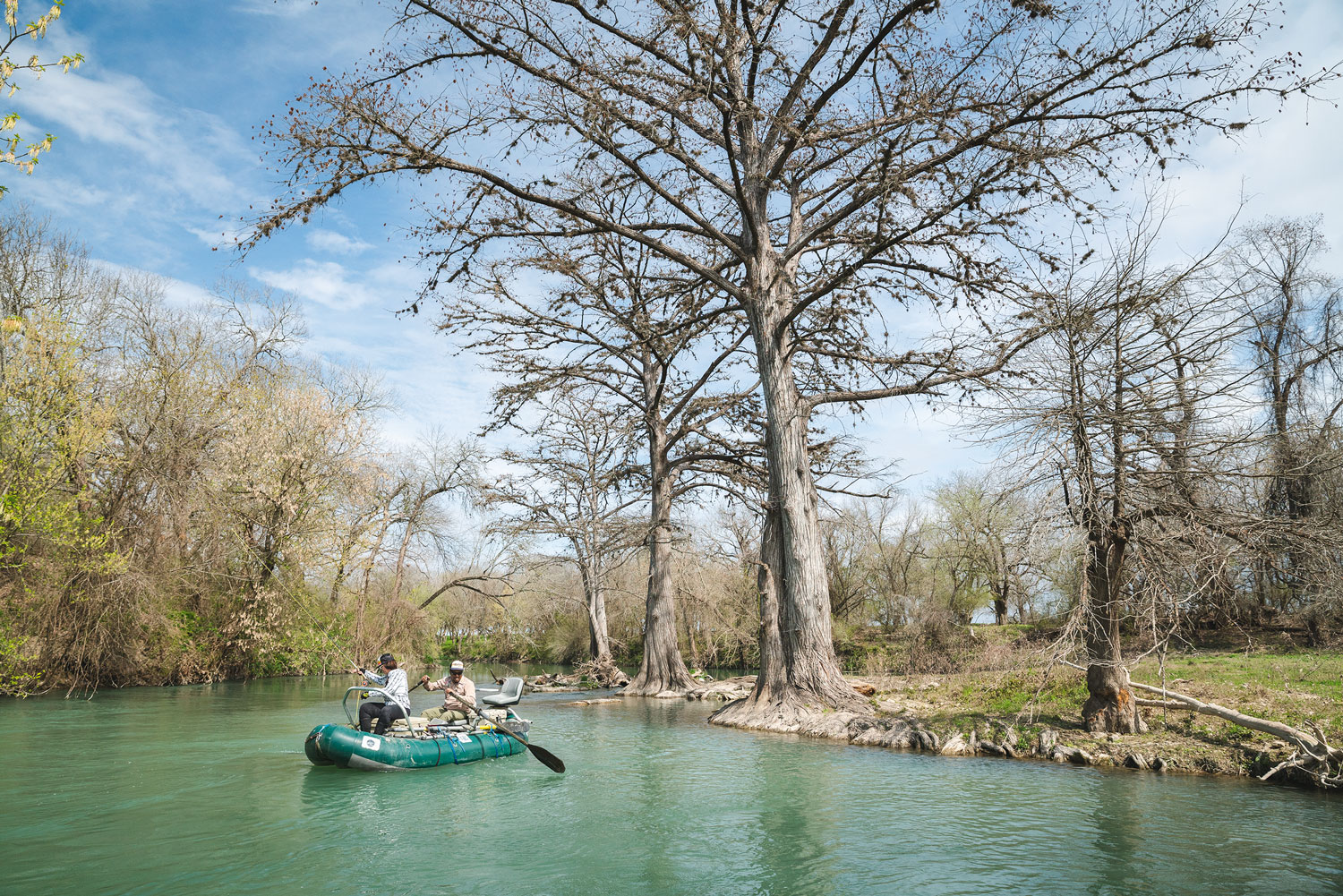
above Dedeaux and his wife, Lenée, float down the Guadeloupe River, TX. They rarely get a day off together, but when they do, they usually end up in the same boat on the same river they guided the day before. Photo: Austin Stapleton
Dedeaux—along with Van Zandt, a fellow YETI ambassador—has been instrumental in reframing the image of what it means to flyfish in Texas. As part of the first generation of professional flyfishers using social media to their advantage, they’re not only beginning to see new interest; they’re beginning to influence how flyfishing is perceived in the state.
“I don’t really feel the need to travel to other places,” Dedeaux says. “I think more people are coming here specifically to flyfish. I thought it was weird the first couple times when I heard somebody say, ‘I want to go to central Texas and catch a Guadalupe bass on a fly.’ It’s actually kind of become a thing.”
Among Texas anglers, it’s common to hear phrases like, “We make the best of it” or “It’s actually not that bad.” But people like Dedeaux are beginning to redirect the conversation. Things are starting to change, and those changes include who’s on the water as well.
Alvin is the last person to bring up the fact that he’s a black flyfisherman, but he also sees the importance of that fact. His presence in fly culture, let alone the success he’s seen in the industry with sponsorships from YETI, Howler Brothers and more, shows a changing tide in angling. With increased popularity comes increased pressure, particularly on the Colorado River, and the sport needs more people considering its sustainability. It seems Dedeaux hasn’t completely lost his punk ethos and his desire to fight for important causes; it’s just been distilled.
“We need more people who are concerned about the places we fish. As the country continues to diversify, we need to continue to share why that’s important,” he says. “[Diversity] is important for the sake of the sport, for the sake of the environment. There’s a whole untapped group of folks of different shades who can help us make sure this stuff doesn’t disappear.”
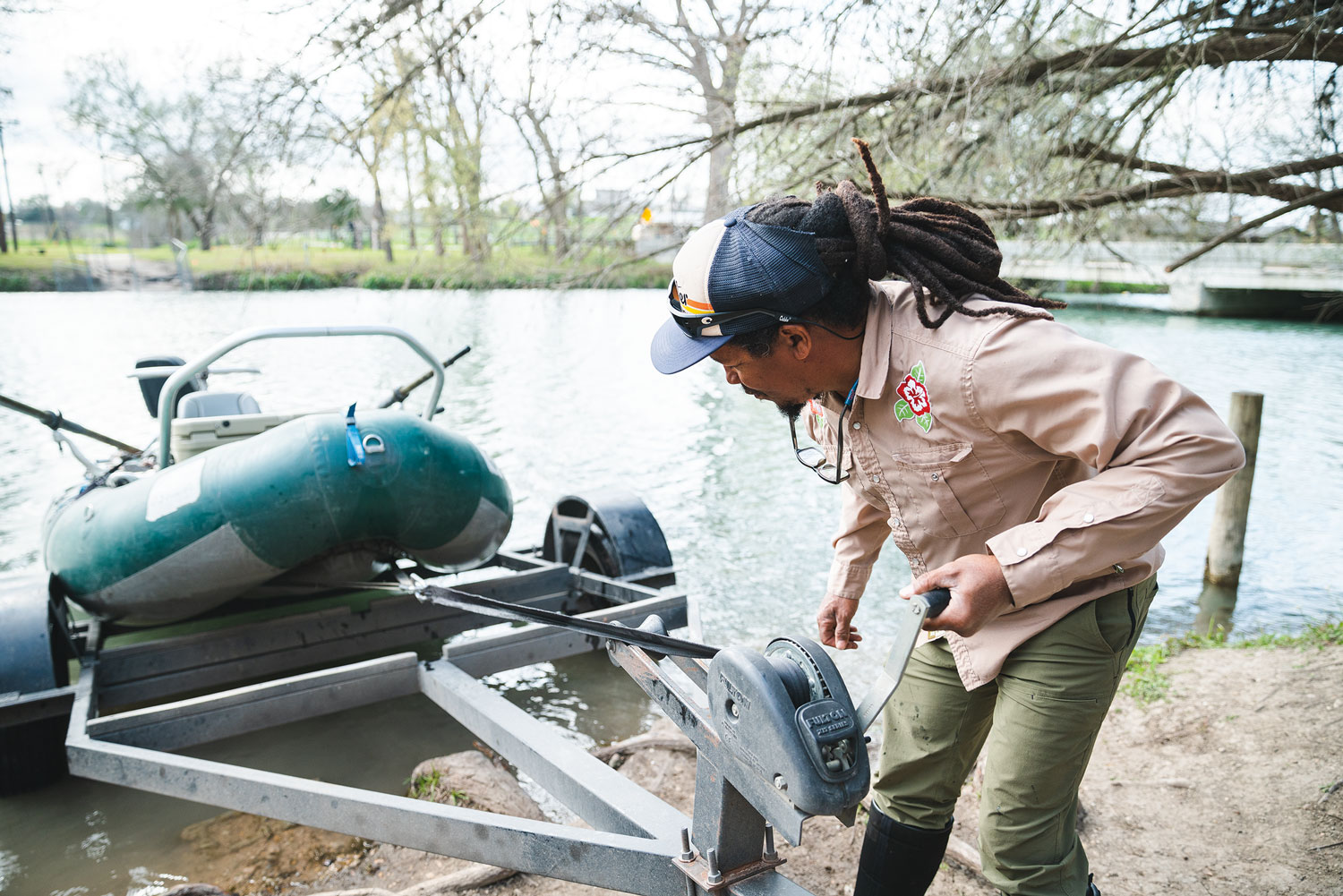
above Dedeaux loads the raft after a day on Texas’ Guadeloupe River. Photo: Austin Stapleton
Late in the afternoon, Dedeaux mentions that he still needs to buy a Christmas tree before it gets dark. He finishes his iced tea, and the waiter stops to grab his tray. The stiff breeze that faced us on the river has calmed to the occasional puff across the outdoor porch of the restaurant. He sits back in his chair and reflects on what he’s seen change throughout the past 40 years in the flyfishing industry.
“Flyfishing is sort of like society as a whole,” he says. “We’re just like everybody else. We just happen to have a fly rod in our hands. Society is constantly evolving, and flyfishing is no different—we’ve just chosen to fling feathers around in the air.”
As we walk out to his boat, he points out that some of these changes are for the better, some are for the worse. He tells me he sees more and more pressure on the water, but also more conservation efforts as well. There are more guides to compete with, but more clients to talk about metal bands and Guadalupe bass with.
Novelist and essayist David Foster Wallace once said, “Of course you end up becoming yourself.” In the end, we are who we are, and many people spend their whole life trying to figure that out. Then there are those like Dedeaux who’ve taken the shortcut to self-realization and never seemed to give it a second thought.
I ask how he pronounces his last name and he says “dee-doh.” He says it roughly translates to “of waters.” It’s hard not to think there’s something to that coincidence. Maybe it’s where he found his shortcut. If Erik Ogershok couldn’t help but be a metal singer, it’s no wonder Alvin Dedeaux ended up a flyfisherman.
